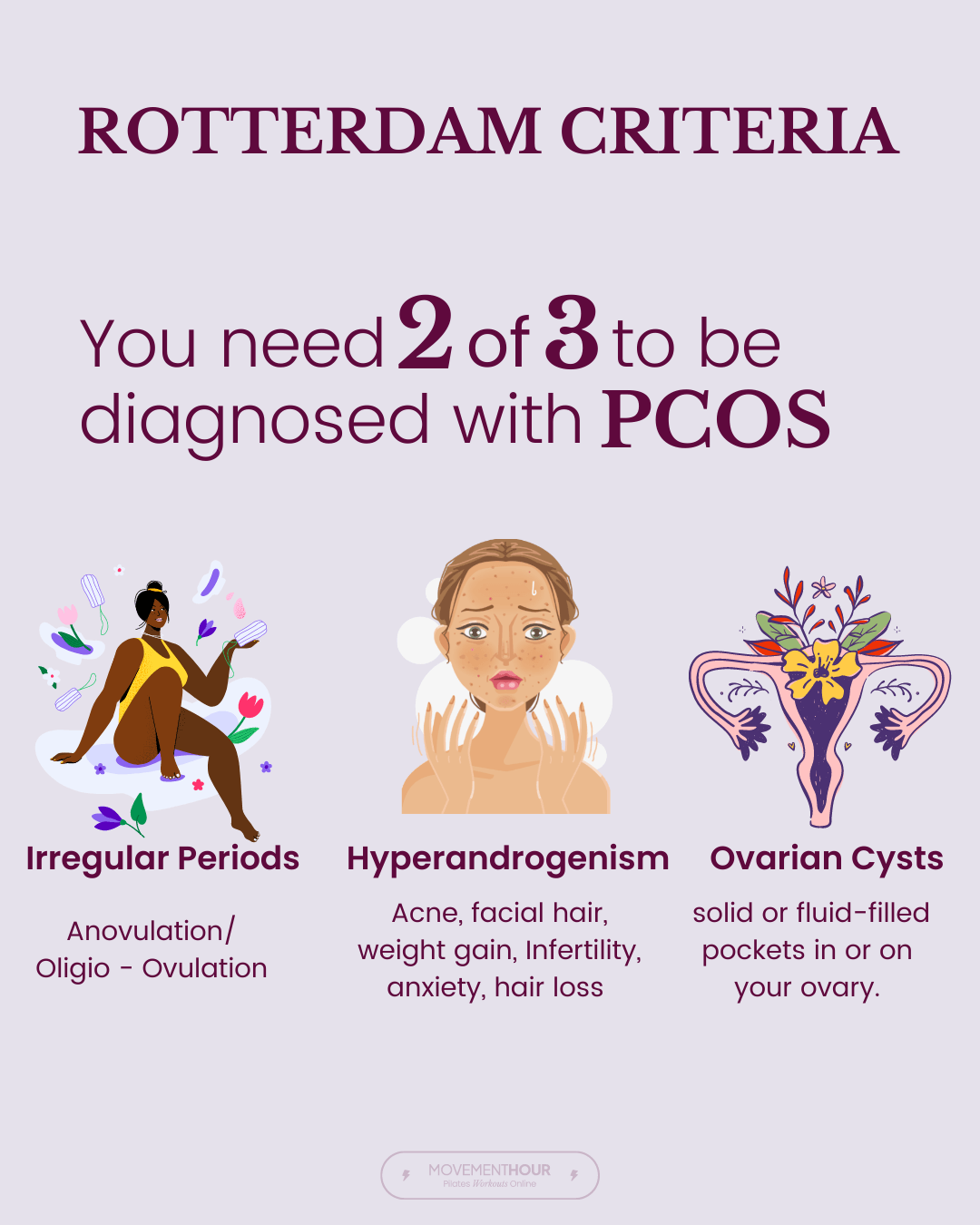Simply put, PCOS is an imbalance/dysregulation of a women's Endocrine System (Hormonal System). More information under the heading below ✨ A Quick Science Lesson ✨
Knowing and Understanding the impact, effects and symptoms of PCOS helps us to better support ourselves and our loved ones 💕 This might be your mom, sister, daughter, wife, girlfriend, or partner.
1 in 10 women has PCOS and between 50-75% go undiagnosed
Unfortunately, there's currently no test/s to definitively diagnose PCOS, however, based on discussions with a medical practitioner, bloodwork, observation and the Rotterdam Criteria, a diagnosis can be made.

There are 3 major categories of associated comorbidities (other conditions) impacted by PCOS
1️. Reproduction
2️. Metabolic
3️. Psychological
The Endocrine system consists of many glands throughout the body that regulates and controls the release of hormones. Hormones regulate blood sugar control, (Insulin), reproductive organs, body growth and energy production.
When the Endocrine system is dysregulated this will affect the proper hormonal function and therefore affect blood sugar control, (Insulin), reproductive organs, body growth and energy production.
There are so many different symptoms for PCOS, depending on your specific Type of PCOS and the severity of the symptom may differ from person-to-person. Also you do not need to have all these to have PCOS
✨ Anovulation or oligo-ovulation, Missed/Irregular periods
✨ Acne (Especially around the jawline and cheeks)
✨ Weight - Difficult losing weight or sudden weight gain without reason
✨ Infertility - Difficulty falling pregnant
✨ Fatigue
✨ Anxiety
✨ Depression
✨ Insulin Resistance
✨ Cortisol Dysregulation
✨ Thyroid Dysregulation
✨ Thinning Hair, Male-pattern Baldness (Androgenic-Alopecia)
✨ Darkened skin patches
✨ Skin tags
✨ Hirsutism [Increased hair growth: jawline, upper lip, stomach, back]
✨ Ovaries that are large and have many cysts
📌
IMPORTANT: A person does not need to have cysts to have PCOS and if a person only has cysts this does not garunteee they have PCOS. Discussions with a medical practitioner, bloodwork, observation of symptoms and the Rotterdam Criteria are all tools which are used to make a diagnosis.
📍 There's a lot of variability with PCOS symptoms. Every year more & more information is being revealed as they discover more information through research and other women in communities sharing their personal experience with PCOS
According to an article by Cleveland Clinic. "Yes, it is possible to have PCOS without all the symptoms."
Mild PCOS is where the symptoms are not severe enough for you to notice and very often why women go undiagnosed until they have difficulty getting pregnant or they are suddenly gaining weight for unknown reasons.
PCOS is much more than infertility and weight gain. Different Symptoms can be triggered (show up) at different times in our life, depending on our environmental factors (especially internal & external stressors) and unless a practioner makes the connection between current & previous symptoms or diagnoses, getting an official diagnosis may be difficult or near to impossible.
You're probably wondering what caused this 🤷 Always remember that PCOS is not your fault.
The cause of polycystic ovary syndrome (PCOS) isn't well understood and a combination of genetics and environmental factors can trigger PCOS.
The lifestyle choices we make can affect our PCOS symptoms for the good or the bad. With the right lifestyle choices, we can better manage, improve or possibly reverse our PCOS symptoms.
✨ Age
✨ Weight
✨ Environment
✨ Genetics
✨ Socio-Emotions
As you may already know, there's no test to definitively diagnose PCOS. However, based on discussions with a medical practitioner, bloodwork, observation and the Rotterdam Criteria and diagnoses can be made.
Contact a Naturopath or Endocrinologist that can do the required bloodwork (refer to the table below, Which Hormones affect PCOS). There are other disorders that can mimic PCOS Symptoms. The Naturopath or Endocrinologist can assist you with proper diagnoses and the next steps in your health journey.
Which hormones affect PCOS?
🧬 Androgens (like testosterone and androstenedione).
🧬 Luteinizing hormone (LH)
🧬 Follicle-stimulating hormone (FSH)
🧬 Estrogen
🧬 Progesterone
🧬 Insulin
Disclaimer: The Information provided on the MovementHour website, social media and blog are for informational and educational purposes only. It does not serve as medical advice or diagnosis. Please consult with a healthcare practitioner for proper diagnosis.
3 vital functions of your Endocrine System
McCulloch, F. (2016). 8 Steps to reverse your PCOS: A proven program to reset your hormones, repair your metabolism and restore your fertility. Greenleaf Book Group Press